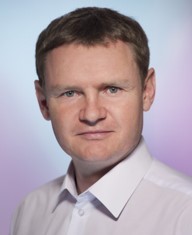Invited speakers
 Petr Neugebauer
Petr Neugebauer
Petr Neugebauer, born in 1980, is a research group leader of the Magneto-Optical and THz Spectroscopy group at the Central European Institute of Technology (MOTeS CEITEC), Brno University of Technology (BUT) in the Czech Republic, performing research and teaching activities as an Associated Professor.
He has over 15 years of experience with the construction of THz measurements system. He has an established track record in the development of Electron Spin Resonance (ESR) methods and Nuclear Magnetic Resonance (NMR) signal enhancement using Dynamic Nuclear Polarization (DNP). He applies these methods to study the electronic properties of molecular nanomagnets, as well as solid state materials.
Dr. Neugebauer performs his research in the context of many national and international projects. In this regards he attracted more than 8 M EUR from national and international funds. Since 2018, he has been a principal investigator of ERC Starting Grant under Horizon Europe dealing with development of a general-purpose state-of-the-art broadband Electron Paramagnetic Resonance spectrometer based on THz rapid frequency scans (THz-FRaScan-EPR) allowing multi-frequency relaxation studies of a variety of samples ranging from bulk (crystal) materials, over powdered samples to air-sensitive samples in liquid solutions. Since 2020, he has lead an international team who is implementing this method into the NMR systems under GAČR EXPRO project. He supervise or supervised over 50 people of more than 12 nationalities in the areas of magnetic resonance, molecular magnetism and THz technology.
Petr became involved in high-frequency spectroscopy during his PhD studies at The Grenoble High Magnetic Field Laboratory, supervised by Dr. Anne-Laure Barra. Following this, he worked for two years as a postdoctoral researcher with Prof. Thomas F. Prisner’s group at the Biomolecular Magnetic Resonance Center, J. W. Goethe University, Frankfurt, where his research focused on combining HFESR and NMR spectroscopy, specifically concerning hyperpolarization of nuclei (Dynamic Nuclear Polarization, DNP) through the polarization transfer from electron to nucleus in order to enhance NMR signals. Subsequently, in the group of Prof. Joris van Slageren in Stuttgart in 2012, he continued to work on the development and application of HFESR and Frequency Domain Magnetic Resonance (FDMR) at frequencies from 80 GHz to 1100 GHz and magnetic fields of up to 17 T. In 2014, he received his first DFG grant (NE1900/2-1, 240 k EUR) to study THz and sub-THz excitations in graphene-based materials by applying magneto-optical spectroscopy, and thus to establish his own research group. Later, he was awarded a DFG grant (SPP1601, NE1900/3-2, 250 k EUR) and became a member of Baden-Württemberg Elite Program to further explore THz and subTHz spectroscopy at the University of Stuttgart. In 2016, he received the ERC Starting grant mentioned above, “THz Frequency Rapid Scan – Electron Spin Resonance spectroscopy for spin dynamics investigations of bulk and surface materials (THz-FRaScan-ESR)”. Subsequently in 2017, with colleagues from institutions at Brno University of Technology, University of Stuttgart, Centro de Investigacion Cooperativa en Nanociencias CIC NANOGUNE and Thomas Keating Ltd., he obtained the European grant FET-Open supported by Horizon 2020 named “Plasmon Enhanced Terahertz Electron Paramagnetic Resonance (PETER)”. In 2018, he established the MOTeS CEITEC group at BUT in Czech Republic.
During his scientific carrier, Dr. Neugebauer presented more than 50 invited lectures at many institutes and international meetings across the world (Brazil, Canada, China, Germany, France, Italy, Morocco, Poland, Russia, Slovakia, Slovenia, USA, among others), and organized number of international events (8th EFEPR summer school, German-Czech workshops, etc.). He is an author or co-author of 55 original scientific papers in ISI-indexed journals (including Nature Com., Nature Phys., J. Am. Chem. Soc., Phys. Rev. Lett., Phys. Chem. Chem. Phys., etc.) with over 2330 citations and one book chapter. His h-index is 20 according to Web of Science, ORCID: 0000-0001-7095-6401.
Assoc. Prof. Dr.-Ing. Petr Neugebauer
Central European Institute of Technology of the Brno University of Technology
Purkyňova 656/123
612 00 Brno
Czech Republic
Petr.Neugebauer@ceitec.vutbr.cz
